#alignment problem
Text
Solar is a market for (financial) lemons

There are only four more days left in my Kickstarter for the audiobook of The Bezzle, the sequel to Red Team Blues, narrated by @wilwheaton! You can pre-order the audiobook and ebook, DRM free, as well as the hardcover, signed or unsigned. There's also bundles with Red Team Blues in ebook, audio or paperback.

Rooftop solar is the future, but it's also a scam. It didn't have to be, but America decided that the best way to roll out distributed, resilient, clean and renewable energy was to let Wall Street run the show. They turned it into a scam, and now it's in terrible trouble. which means we are in terrible trouble.
There's a (superficial) good case for turning markets loose on the problem of financing the rollout of an entirely new kind of energy provision across a large and heterogeneous nation. As capitalism's champions (and apologists) have observed since the days of Adam Smith and David Ricardo, markets harness together the work of thousands or even millions of strangers in pursuit of a common goal, without all those people having to agree on a single approach or plan of action. Merely dangle the incentive of profit before the market's teeming participants and they will align themselves towards it, like iron filings all snapping into formation towards a magnet.
But markets have a problem: they are prone to "reward hacking." This is a term from AI research: tell your AI that you want it to do something, and it will find the fastest and most efficient way of doing it, even if that method is one that actually destroys the reason you were pursuing the goal in the first place.
https://learn.microsoft.com/en-us/security/engineering/failure-modes-in-machine-learning
For example: if you use an AI to come up with a Roomba that doesn't bang into furniture, you might tell that Roomba to avoid collisions. However, the Roomba is only designed to register collisions with its front-facing sensor. Turn the Roomba loose and it will quickly hit on the tactic of racing around the room in reverse, banging into all your furniture repeatedly, while never registering a single collision:
https://www.schneier.com/blog/archives/2021/04/when-ais-start-hacking.html
This is sometimes called the "alignment problem." High-speed, probabilistic systems that can't be fully predicted in advance can very quickly run off the rails. It's an idea that pre-dates AI, of course – think of the Sorcerer's Apprentice. But AI produces these perverse outcomes at scale…and so does capitalism.
Many sf writers have observed the odd phenomenon of corporate AI executives spinning bad sci-fi scenarios about their AIs inadvertently destroying the human race by spinning off in some kind of paperclip-maximizing reward-hack that reduces the whole planet to grey goo in order to make more paperclips. This idea is very implausible (to say the least), but the fact that so many corporate leaders are obsessed with autonomous systems reward-hacking their way into catastrophe tells us something about corporate executives, even if it has no predictive value for understanding the future of technology.
Both Ted Chiang and Charlie Stross have theorized that the source of these anxieties isn't AI – it's corporations. Corporations are these equilibrium-seeking complex machines that can't be programmed, only prompted. CEOs know that they don't actually run their companies, and it haunts them, because while they can decompose a company into all its constituent elements – capital, labor, procedures – they can't get this model-train set to go around the loop:
https://pluralistic.net/2023/03/09/autocomplete-worshippers/#the-real-ai-was-the-corporations-that-we-fought-along-the-way
Stross calls corporations "Slow AI," a pernicious artificial life-form that acts like a pedantic genie, always on the hunt for ways to destroy you while still strictly following your directions. Markets are an extremely reliable way to find the most awful alignment problems – but by the time they've surfaced them, they've also destroyed the thing you were hoping to improve with your market mechanism.
Which brings me back to solar, as practiced in America. In a long Time feature, Alana Semuels describes the waves of bankruptcies, revealed frauds, and even confiscation of homeowners' houses arising from a decade of financialized solar:
https://time.com/6565415/rooftop-solar-industry-collapse/
The problem starts with a pretty common finance puzzle: solar pays off big over its lifespan, saving the homeowner money and insulating them from price-shocks, emergency power outages, and other horrors. But solar requires a large upfront investment, which many homeowners can't afford to make. To resolve this, the finance industry extends credit to homeowners (lets them borrow money) and gets paid back out of the savings the homeowner realizes over the years to come.
But of course, this requires a lot of capital, and homeowners still might not see the wisdom of paying even some of the price of solar and taking on debt for a benefit they won't even realize until the whole debt is paid off. So the government moved in to tinker with the markets, injecting prompts into the slow AIs to see if it could coax the system into producing a faster solar rollout – say, one that didn't have to rely on waves of deadly power-outages during storms, heatwaves, fires, etc, to convince homeowners to get on board because they'd have experienced the pain of sitting through those disasters in the dark.
The government created subsidies – tax credits, direct cash, and mixes thereof – in the expectation that Wall Street would see all these credits and subsidies that everyday people were entitled to and go on the hunt for them. And they did! Armies of fast-talking sales-reps fanned out across America, ringing dooorbells and sticking fliers in mailboxes, and lying like hell about how your new solar roof was gonna work out for you.
These hustlers tricked old and vulnerable people into signing up for arrangements that saw them saddled with ballooning debt payments (after a honeymoon period at a super-low teaser rate), backstopped by liens on their houses, which meant that missing a payment could mean losing your home. They underprovisioned the solar that they installed, leaving homeowners with sky-high electrical bills on top of those debt payments.
If this sounds familiar, it's because it shares a lot of DNA with the subprime housing bubble, where fast-talking salesmen conned vulnerable people into taking out predatory mortgages with sky-high rates that kicked in after a honeymoon period, promising buyers that the rising value of housing would offset any losses from that high rate.
These fraudsters knew they were acquiring toxic assets, but it didn't matter, because they were bundling up those assets into "collateralized debt obligations" – exotic black-box "derivatives" that could be sold onto pension funds, retail investors, and other suckers.
This is likewise true of solar, where the tax-credits, subsidies and other income streams that these new solar installations offgassed were captured and turned into bonds that were sold into the financial markets, producing an insatiable demand for more rooftop solar installations, and that meant lots more fraud.
Which brings us to today, where homeowners across America are waking up to discover that their power bills have gone up thanks to their solar arrays, even as the giant, financialized solar firms that supplied them are teetering on the edge of bankruptcy, thanks to waves of defaults. Meanwhile, all those bonds that were created from solar installations are ticking timebombs, sitting on institutions' balance-sheets, waiting to go blooie once the defaults cross some unpredictable threshold.
Markets are very efficient at mobilizing capital for growth opportunities. America has a lot of rooftop solar. But 70% of that solar isn't owned by the homeowner – it's owned by a solar company, which is to say, "a finance company that happens to sell solar":
https://www.utilitydive.com/news/solarcity-maintains-34-residential-solar-market-share-in-1h-2015/406552/
And markets are very efficient at reward hacking. The point of any market is to multiply capital. If the only way to multiply the capital is through building solar, then you get solar. But the finance sector specializes in making the capital multiply as much as possible while doing as little as possible on the solar front. Huge chunks of those federal subsidies were gobbled up by junk-fees and other financial tricks – sometimes more than 100%.
The solar companies would be in even worse trouble, but they also tricked all their victims into signing binding arbitration waivers that deny them the power to sue and force them to have their grievances heard by fake judges who are paid by the solar companies to decide whether the solar companies have done anything wrong. You will not be surprised to learn that the arbitrators are reluctant to find against their paymasters.
I had a sense that all this was going on even before I read Semuels' excellent article. We bought a solar installation from Treeium, a highly rated, giant Southern California solar installer. We got an incredibly hard sell from them to get our solar "for free" – that is, through these financial arrangements – but I'd just sold a book and I had cash on hand and I was adamant that we were just going to pay upfront. As soon as that was clear, Treeium's ardor palpably cooled. We ended up with a grossly defective, unsafe and underpowered solar installation that has cost more than $10,000 to bring into a functional state (using another vendor). I briefly considered suing Treeium (I had insisted on striking the binding arbitration waiver from the contract) but in the end, I decided life was too short.
The thing is, solar is amazing. We love running our house on sunshine. But markets have proven – again and again – to be an unreliable and even dangerous way to improve Americans' homes and make them more resilient. After all, Americans' homes are the largest asset they are apt to own, which makes them irresistible targets for scammers:
https://pluralistic.net/2021/06/06/the-rents-too-damned-high/
That's why the subprime scammers targets Americans' homes in the 2000s, and it's why the house-stealing fraudsters who blanket the country in "We Buy Ugly Homes" are targeting them now. Same reason Willie Sutton robbed banks: "That's where the money is":
https://pluralistic.net/2023/05/11/ugly-houses-ugly-truth/
America can and should electrify and solarize. There are serious logistical challenges related to sourcing the underlying materials and deploying the labor, but those challenges are grossly overrated by people who assume the only way we can approach them is though markets, those monkey's paw curses that always find a way to snatch profitable defeat from the jaws of useful victory.
To get a sense of how the engineering challenges of electrification could be met, read McArthur fellow Saul Griffith's excellent popular engineering text Electrify:
https://pluralistic.net/2021/12/09/practical-visionary/#popular-engineering
And to really understand the transformative power of solar, don't miss Deb Chachra's How Infrastructure Works, where you'll learn that we could give every person on Earth the energy budget of a Canadian (like an American, but colder) by capturing just 0.4% of the solar rays that reach Earth's surface:
https://pluralistic.net/2023/10/17/care-work/#charismatic-megaprojects
But we won't get there with markets. All markets will do is create incentives to cheat. Think of the market for "carbon offsets," which were supposed to substitute markets for direct regulation, and which produced a fraud-riddled market for lemons that sells indulgences to our worst polluters, who go on destroying our planet and our future:
https://pluralistic.net/2021/04/14/for-sale-green-indulgences/#killer-analogy
We can address the climate emergency, but not by prompting the slow AI and hoping it doesn't figure out a way to reward-hack its way to giant profits while doing nothing. Founder and chairman of Goodleap, Hayes Barnard, is one of the 400 richest people in the world – a fortune built on scammers who tricked old people into signing away their homes for nonfunctional solar):
https://www.forbes.com/profile/hayes-barnard/?sh=40d596362b28
If governments are willing to spend billions incentivizing rooftop solar, they can simply spend billions installing rooftop solar – no Slow AI required.

Berliners: Otherland has added a second date (Jan 28 - TOMORROW!) for my book-talk after the first one sold out - book now!

If you'd like an essay-formatted version of this post to read or share, here's a link to it on pluralistic.net, my surveillance-free, ad-free, tracker-free blog:
https://pluralistic.net/2024/01/27/here-comes-the-sun-king/#sign-here

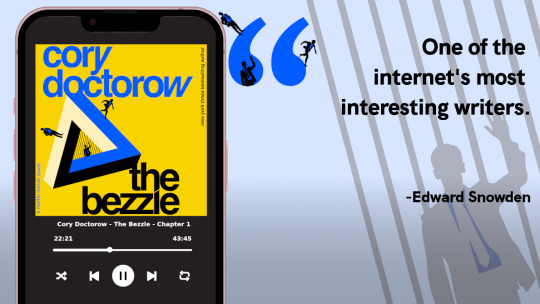
Back the Kickstarter for the audiobook of The Bezzle here!

Image:
Future Atlas/www.futureatlas.com/blog (modified)
https://www.flickr.com/photos/87913776@N00/3996366952
--
CC BY 2.0
https://creativecommons.org/licenses/by/2.0/
J Doll (modified)
https://commons.wikimedia.org/wiki/File:Blue_Sky_%28140451293%29.jpeg
CC BY 3.0
https://creativecommons.org/licenses/by/3.0/deed.en
#pluralistic#solar#financialization#energy#climate#electrification#climate emergency#bezzles#ai#reward hacking#alignment problem#carbon offsets#slow ai#subprime
234 notes
·
View notes
Text
To Counter AI Risk, We Must Develop an Integrated Intelligence
The explosive rise in the power of AI presents humanity with an existential risk. To counter that risk, and potentially redirect our civilization’s trajectory, we need a more integrated understanding of the nature of human intelligence and the fundamental requirements for human flourishing.
The recent explosion in the stunning power of artificial intelligence is likely to transform virtually…
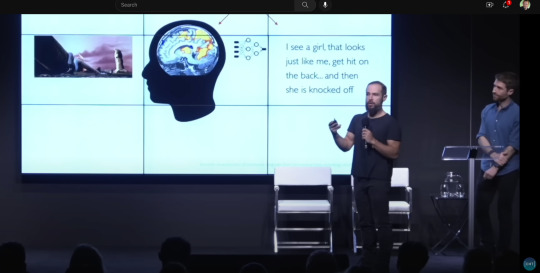
View On WordPress
#AI#alignment problem#animate intelligence#conceptual intelligence#integrated intelligence#metacrisis
0 notes
Text
reblog this w the entity/entities you most align yourself with & why
#im curious to know whats most common#and the reasons behind certain ones#can't imagine people willingly aligning themselves with the flesh for example#so if you do#.. im interested in how your mind works#tma#tmagp#the magnus archives#the magnus protocol#smirke's fourteen#smirkes 14#tma entities#helix speaks#for me personally its obviously the spiral#mainly cuz i got a lot of Brain problems#that mess w my perception#also a history of hallucinations#and its nice to blame them on me being just a little spooky 🤪#cuz attributing them to their actual cause#is a Bummer
324 notes
·
View notes
Text
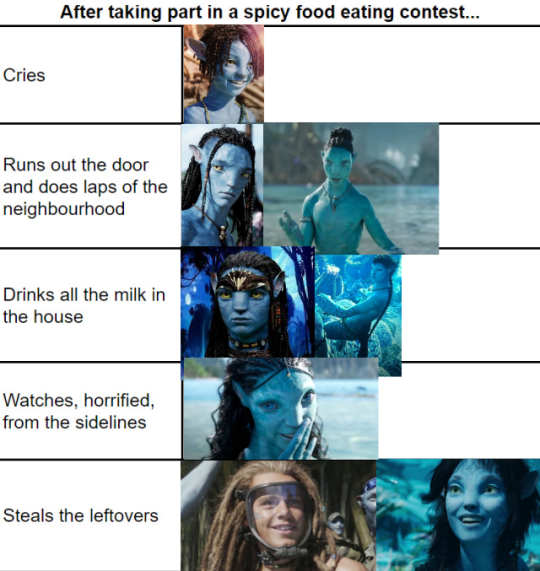
#Someone who isn't me write this fic 👀#Still debating on if I like where I put Kiri but other than that I think I like all these alignments#To me Kiri is either eating all of it no problem or won't touch with a ten foot pole and there is no in between#avatar the way of water#avatar 2#avatar 2009#Neteyam#Lo'ak#Kiri#Spider#Tuk#Rotxo#Aonung#Tsireya
2K notes
·
View notes
Text
my insane c!stageduo headcanon list (incomplete) (aka: communication skills, just NOT these guys' forte, jesus christ)
c!dream never tells c!punz about scrapped lore. if he was really betrayed, after all, it would be more optimal to keep his potential betrayer from knowing what really happened, wouldn't it? if that happened. he's safe, no matter what, really. he has an impenetrable fortress and he's the only one with the keys. let them buy his mercenary, let them pound on his walls. sapnap has been howling outside for months and even with the greenery that's begun to grow in the cracks, nobody has ever managed to step a foot inside. quackity's fake cell had none of the defenses of the real one, he has nothing, just a pale shade of the glory that had resulted from countless hours of building and brainstorming and carving the glory that is pandora's fucking vault out from the sea. the next time they meet, it's almost a month later, and nothing further happens. he's not ambushed. there's no traps, no cells (he would be able to escape anything anyway, with pearls and totems and gapples in his inventory) (he only surrendered on that stage because it was the part to play, not because he couldn't literally make his way out with the gear he had) (he was in total control then. he still is now.) (when wilbur and tommy show up in the prison lobby just a few weeks later, for a second, he still wonders.)
c!dream never tells c!punz how long he was tortured. c!punz's job was to watch and wait. he did. he didn't make a scene of it, of course, and neither did he spend much time on spying on the prison, specifically (there was work to be done, after all. knowledge to gather. time, he found, is a delicate thing, and it would be remiss to not take advantage of the lack of scrutiny that comes with being seen as the server's hero) but part of keeping an eye on the server means keeping an eye on the prison (if anything is compromised, he'll have to take their research and run as soon as possible. they have a hidden base somewhere far out, where he can revive dream if necessary.) he has to watch a little bit closer after ranboo gets locked out, but he knows better than to try and visit--he sees quackity getting in an out, and well, a visitor means there must still be a prisoner to see, doesn't it? the first time he catches quackity visiting is march. the last time he does, it's september, and quackity looks harried as he runs to las nevadas. punz passes dried blood on the prime path a few times. dream tells him things went south, and mentions plans to attack quackity a few months after his escape with a keycard now dangling between his fingers, and so when he tells purpled over half a year later, it's just math, isn't it.
c!punz meeting with c!purpled to tell him about the revenge plan against quackity was behind c!dream's back. the question we get repeatedly in this scene is why punz is the one carrying the message at all, and there's a difference between dream bringing up his torture and how punz was emphasizing how fucked up he got from it. further, while c!dream emphasized how important it was that no one put together that he and c!punz were on the same side after staged finale repeatedly in the finale streams, c!punz was the one to break their cover by reviving c!dream in front of clingyduo when he could've done so in secret after the two of them left, meaning we have a precedent for c!punz being willing to break their cover for revenge-related purposes.
c!punz sees the inside of the prison exactly once before the finale streams. c!dream shows it off a little while after daedalus, before the lobby gets overgrown with stalagtites and vines, before he's scrawled over the walls in ink. he shows off the keycard, the security mechanisms, the lava-filled antechamber, the main cell. punz makes a comment about the blocks of netherite, only a little awkwardly. there's still blood soaked into the chest, permanently. dream mentions that there was a dog that sat there once, before sam killed it.
before the prison, in the experiments that they run once they've ensured the book works, punz dies--actually dies--exactly once as well. he has a better familiarty with magic and runes than dream, who knows enough to muddle his way through enchants and little more than that, and part of the reason why he was chosen in their little trio to be the one with the revive book was his aptitude in more magical things. (dream was a survivalist, not a mage, and punz had a whole secret potion room before pretty much anyone on the server.) limbo has schlatt, and had wilbur, (and schlatt saw dream with his book of moon runes, and ghostbur knew about the revive book on doomsday) and dream was the one, after all, to make his agreements with both--it just made sense for him to be the one to communicate. made sense not to let punz's presence become too obvious, even to the dead--ghosts are real, after all, and not all of them are known for keeping secrets. dream was the one that needed to have lives to lose in their little show, and dream was the one that might need to be revived remotely, if there were any unforeseen issues, and dream was the one that needed to die in front of the server and be carried off into the heart of the prison--where his endurance would be key to their survival. where it certainly wouldn't hurt to be prepared, to know exactly what he may have to survive (i thought i would be fine with raw potatoes) (do you know what that does to a person?, and the warmth of dream's blood on his palms.) limbos change based on the way that you die, and tommy saw darkness, and then happiness that didn't belong to him, and dream--well it wasn't his first time--and punz said, you know, my limbo sucks, (singular). it's simply more efficient to keep one person clear-minded enough to do what needs to be done, and limbo puts you through the wringer. that's alright. punz and dream like efficiency.
dream never stops paying punz.
#sorry that it's all angst unfortunately c!dream's mental breakdown era is almost perfectly aligned with c!drunz era in canon . sad#dreblr#pokes c!dream with a stick. boy you have every problem ever#c!punz when his employer ally friend guy has been holed up in a fortress for three months straight: did you try the revenge plan#the revenge plan sounds fun
99 notes
·
View notes
Text
Traumatizing the brothers but its ok because they'll be fine eventually

#an au is being madeeeee#problem is this is a spoiler for the second part of story so its not seeing the light of day any time soon#when I tell you the stars perfectly aligned for me ro make a longtime concept into an existing thing#dreamtale and sonic tomfoolery#tgtd#littol doodl#me does arts
120 notes
·
View notes
Text
this is everyone's reminder that under no circumstances is it okay to tell someone to kill and/or harm themselves.
#fandoms i'm looking STRAIGHT at you#i'm not one to get into discourse but god... can I just. point this out once?? it's disappointing#it's not exclusive to either since this is an /actual/ problem#form a sense of consciousness.#you want to talk about morals? get yours aligned first. tie your tongue to your brain#probably the only time i'll vaguely speak on this#live laugh love on planet fandoms please and thank you#fandom etiquette#important
82 notes
·
View notes
Note
Hiii, i love your stuff and kinda from a distance really look up at you for, in my perception, being able to express yourself without giving a fuck. Thats sick dude, Im so so afraid, of absolutely everything, its nice to think like i might grow into someone less apologetic of my existence. Nice to see people just being yknow
hey, thank you, this is really really nice. the secret that is probably not a secret is that i am also deeply afraid a lot of the time lmao -- but less than i used to be, and in ways that feel less stifling and self-suffocating, if that makes sense.
like, it used to be "i'm scared that if i express myself the way i want to, everyone will find me obnoxious, so let's just sand those edges down to be safe" -- now my fears are more like "now that i'm expressing myself in a way that feels natural and real, i'm afraid that it's all stupid/vapid/not worthwhile or meaningful" (<- specifically abt my art) or "i'm happy that i talk and act the way i want to now, but what if it makes me impossible to befriend," etc etc etc. which still feels bad and puts me in a funk a lot of the time but at least it's a fear that comes After/in reaction to doing stuff, rather than a fear that STOPS me from doing stuff, you know? like, it's evolved into a kind of fear that's less in my way.
anyway. i believe you'll experience something like this, because wanting to grow is the first step of growing. the fact that u hope or wish for something different means you're already on your way. to fewer fucks!! or at least distributing the fucks u give in a way that serves u better
#stuff like accepting that i'm reserved and i'm not very accessible via messages.#or that my online tone isn't very bubbly and it's weird and uncomfortable to force it.#i stop letting fears about that shape my behavior ('i'll look mean or snotty so let's force markers of Friendliness to avoid that!!') -#- and instead act the way i want to and then trade it in for new fears that come After the action.#also a good reminder to give urself is that if ur fear is abt how other ppl perceive u (as 90% of mine is personally)#u really... can't actually control that. and being very very anxious abt it all the time is usually ur brain throwing a tantrum abt not--#--having that control. bc it is understandably very scary that u don't have that control#as much as it sucks + is terrifying the truth is the only thing u can do is ask urself 'am i behaving in a way that i'm proud of'#'am i behaving in a way that's in alignment w my values + what i think is important'#bc if the answer to that is yes and somebody hates u or is deeply offended by ur existence anyway. well. literally not ur problem#but obv being at peace w that is way way easier said than done + requires tons of practice and will take. probably. years. which is fine#i am stuck with myself. i can either contort myself forever trying to be someone everyone will like and find totally nonthreatening and-#inoffensive and in the process exhaust myself totally and never feel safe or natural myself. OR#i can say okay. so i am a kind of prickly guy with stern and drab speech patterns and close to no social energy. and i think i can still be#-sexy and fun this way. and it is up to other ppl to figure out if they can agree w me on that#ANYWAY enough rambling for now. just another one of those things i think abt a lot so i have a lot of ready-made sentences abt it in mind
72 notes
·
View notes
Text
73 Yards
I have slightly mixed feelings on this one, but what it did well it did brilliantly. The episode was beautifully shot with a fantastically creepy atmosphere throughout. The Welsh landscape, the close shots, the out of focus semper distans, the mystery of what was being said. Millie Gibson's performance throughout was stellar and this is the most invested I've felt in her character so far. I did miss Ncuti's presence somewhat, but it says a lot that she was able to carry the episode on her own and I do love when the format gets shaken up occasionally and we get a Doctor-lite episode.
I loved Kate's brief appearance and the way it sold the fact that this was a very serious situation. You think UNIT might be able to help here, but Ruby is once again left alone. The themes of abandonment in this one were incredibly potent and really tie into the themes of the series. Unsurprisingly, one of the most effective and upsetting parts of the episode was Ruby's mum also being affected by the mysterious woman. Her anguished screams for her mum were really quite harrowing, as was that awful comment about her birth mother not wanting her.
It also got far darker than I would expect in a Doctor Who episode. The far-right politician and the threat of nuclear war was plenty, but what was done to Marti was absolutely chilling, as was Ruby's apology for not doing anything. It gets away with it because it's all through implication, but that almost makes it more hard hitting. You don't always need to see the monster in action to know what it's doing. It also reminds me of my much younger self not picking up on the Master beating Lucy Saxon until I was a teenager.
The way time began to speed along was actually quite shocking to begin with - I actually gasped when we saw the 25th birthday cards - and it kept bringing to mind various other episodes where companions have been abandoned either in the real world or another timeline/reality, especially things like The Girl Who Waited, Turn Left, Forest of the Dead, The Lie of the Land, World Enough and Time etc. That things get undone at the end was again a little reminiscent of a few of them, but this is also where we come to my criticisms of the episode, because - while I loved the experience of watching it - the ending feels tacked on in a way that is very unsatisfying.
There were a number of things that just never get explained. For a minor example, why did the Doctor disappear? Disturbing the fairy circle released Mad Jack (I'll come onto him) and also made the Doctor disappear? And also made the TARDIS lock in a way that couldn't be opened with Ruby's key? I'm not as bothered by this as the below, but it feels messy and like an attempt to do a Turn Left without an actual reason for the Doctor to be gone.
A bigger gripe is Ruby being the following lady. That on its own would have been fine, but that combined with other elements just frustrates me. Mainly, if the following lady was Ruby, what is it she says to get people to run away? I don't mind things being left to the imagination - for instance, I quite like that we don't get an explanation for why she has to be 73 yards away; I can infer that that's got something to do with the fairy circle - but it appears that whatever she says specifically makes people think there's something horrifying about Ruby.
What could Old Ruby possibly say to that end and why would she? And why would the same thing make a Prime Minister resign? If we had never found out who she was, I would have been perfectly happy to infer that she was a force of some kind that drives people mad, but it's Ruby! Knowing who she is but not what she does or how or why she does it is the worst way round. I want to know neither or both, or possibly the latter but not the former, but this way round just frustrates me.
On that note, the friend I was watching with pointed out that, as she was dying, elderly Ruby had very short hair and suddenly has long hair when she becomes the semper distans lady. A small detail, perhaps, but one that further muddles the conclusion. Why did her hair change? Where did the coat come from? It's a different actress as well and, even at that distance, you can kind of tell. Did Old Ruby just end up embodying an existing spirit to do with the fairy circle? If so, I would have liked that to be a lot clearer. If not, why does she look so different?
Okay, so, Mad Jack. Who or what is Mad Jack? Is he a spirit of some kind that possesses Roger ap Gwilliam? Was he always Roger ap Gwilliam? Does Roger ap Gwilliam exist without him? If Roger ap Gwilliam does not exist without Mad Jack, how come the Doctor still mentions him? If Roger ap Gwilliam does exist without Mad Jack, what is changed by the Doctor stepping on the fairy circle?
In the version of the timeline we end up on (where the Doctor doesn't step in the fairy circle but Roger ap Gwilliam is still mentioned by him as a dangerous Prime Minister), here are a few possibilities and why they don't work for me:
Does he still become Prime Minister and get taken down another way? Perhaps, but it's not like Turn Left where we know the problems would have been stopped by the Doctor (who's not here). Without Ruby's infiltration and semper distans lady, what stops him? And why was that not able to stop him in the timeline we witnessed?
Is he less dangerous? The second time around of the opening conversation we don't get the line about the brink of nuclear war, though only because Ruby interrupts him to point out the woman, but maybe we can infer that this time he's a dangerous Prime Minister but not that dangerous? That seems quite weak and unclear, though, and seems to disregard the horror of the Marti stuff.
Does the timeline only change after the Doctor's comments about him being a dangerous Prime Minister? He does say that before stepping (or not stepping) in the fairy circle both times. I might be happy to assume that Roger ap Gwilliam never comes to power after that diverging moment has passed, except that things have already changed before the Doctor mentions him because Ruby says she's been to Wales three times. Maybe they've changed a bit but not enough until the moment she stops him from stepping on it, but that is not at all clear.
If it's any of these (or none of them), that's really confusing! It's just so messy and unclear. It would have been a simple fix, too! Keep everything the same and just add in a line as they're walking away at the end along the lines of "thank goodness he never got into power; people never found him that convincing". That would have clarified a) things have changed since a few seconds ago b) that Mad Jack is what allowed him to get to power and c) in this timeline, that won't happen and Ruby won't need to stop him.
Despite all my complaints, I did really love watching this episode. It's just so carelessly wrapped up, as if they didn't think about the implications of the otherwise very well told story. I'll be interested to rewatch it and see if my complaints bother me more or less on second viewing. I really want to love this episode because there were so many fantastic elements, but it just makes all the inconsistencies and loose threads and muddled logic particularly frustrating because they were only another draft or two away from being solved.
Misc small things
No theme tune! I feel robbed! Maybe it was meant to be part of the vibe that we're not in the usual timeline, but come on. It could easily have been slotted in when she left the TARDIS the first time or before she got to the pub!
Other episodes I thought of: Extremis with warning other versions of yourself; The Hungry Earth/Cold Blood with waving at future versions of yourself that disappear when things change; Journey to the Centre of the TARDIS with weird timelines and future selves and things being undone; Last Christmas with the companion becoming elderly; Turn Left for the vibes of "there's something on your back"; Under the Lake/Before the Flood with a silent message, since it looked like the woman was trying to sign things to Ruby; and The Sound of Drums/Last of the Timelords with the triple whammy of the companion having to 1) set off on their own to 2) take down a prime minister and 3) have time reverse.
It's also got a good old bootsrap paradox in it, which doesn't bother me in the way of the above complaints, but for the sake of completionism: How was Ruby warned about the future when that future hasn't happened? Would have loved Twelve to briefly pop his head in and explain it for us.
It's interesting that the snow stopped throughout this version of her life. It also seemed to snow while she was on her way to the pub.
Kate's comment about how "this timeline might be suspended along your event" was interesting and I wonder if it connects with the snow stopping.
For the first time I actually recognised Susan Twist when she appeared, but I'm not sure I would have done without Ruby realising she recognised her. I liked that! It felt very Boom Town and recognising Bad Wolf coming up again.
There was a little cameo from Mrs Flood.
#doctor who#73 yards#doctor who spoilers#ruby sunday#right I've spent an hour and a half writing this goddamn review because my complaints were very thorny#and I wanted to phrase them in a way that clearly laid out the problem#it's probably time to go to bed#mine#dw#dwmine#reactions#dwe15#all the way through this one I was so excited to be loving it#just really wish it had stuck the landing#I'll be interested to see other people's reactions to it#is the general opinion aligned with mine or totally different?
28 notes
·
View notes
Text
Me: here's a drawing of a guy with long hair
Everyone, every time, for some reason: What a pretty lady, whats her name :) ?
#look i get it i understand#i tend to draw things more smooth and cutesy and that aligns more with femininity for whatever reason#but cmon.... even when i tag the guy....#I made my all time fav guy oc with long hair nonbinary literally cuz i was like 'ya know what he wouldnt even have a problem with this'#everyone assuming Bunny is a girl cuz he was a rabbit that i drew in a lil skirt and wore pink? thats fine thats understandable#but straight up every time ever??? I thought id gotten better at drawing and people would just know but i guess not
110 notes
·
View notes
Text

#go with me here#if you don’t understand why jiraiya is a public enemy that’s your problem#alignment chart#naruto#team 7#team kakashi#team 8#team gai#team 10#ino shika cho#sand siblings#team taka#lord third#legendary sannin#kakashi#asuma sarutobi#kurenai yuhi
252 notes
·
View notes
Text
the mental gymnastics this man is currently engaging in to justify theft could win him a gold metal at the olympics
#apollo's tag#keys mianite s1 rewatch#the great thing about tom syndicate is that there Is a reason that he does things. theres a method to his madness. theres internal logic.#however the ways he goes about satisfying said internal logic is. well to put it bluntly it's Quite Fucked#and thats what makes it fun!#theres a legitimate reason as to why he does what he does. unfortunately for everyone else those reasons happen to be insane#tom actually has a pretty strong moral compass that he dutifully follows most of the time#the only problem with that is that his morals are really really out of alignment with everyone else's and also are just generally fucked#but hey its fun to watch!
21 notes
·
View notes
Text

#I'm not saying the stars are aligning but#y'know#just imagine#jon stewart#the problem with jon stewart#the daily show with jon stewart#late night#meme#it's unlikely but god i wish
56 notes
·
View notes
Text
Ignoring the entire shitshow around Eurovision this year, it was pretty solid for music.
Switzerland absolutely deserved to win. The Code is a bop and their performance was my favourite of the evening.
Croatia also was really good. Baby Lasagna has a really strong voice and I really liked the vibes of it overall. Also, he's apparently an Electric Callboy fan, so that's a plus in my book.
Ireland was solid. I don't think I like the song as much as other people, but their staging and the screamo parts of the song were perfection.
On the other hand, Israel got way too many points. I kind of expected it, but it still stings. Like, even if the votes were unpolitical (which is highly doubtful), the song wasn't that good. Lativa had a way better ballad.
A thing I definitely didn't expect though, was Germany being in 12th place. It feels wrong to see us on the left side of the scoreboard. Though it is also funny, because Isaak told a newspaper: "who would want to end up on place 12?" He really jinxed himself with that one.
#eurovision#disclaimer: just my opinion#man this year was exhausting as f*ck#disqualifying the Netherlands sure was a decision#but we know nothing about the situation#like what happened?#someone said that he just showed them the middle finger#but didn't provide any sources#that's in general my big problem with the tag#there was so much speculation and rumors that were presented as facts without sources or proper research#like#seriously guys#genuinely so much problems could have been prevented if Isr**l had just been banned from participating#I do kind of feel bad for her#but she also very openly aligns herself with Israel's government#so it's not much#anyhoot#I'm gonna go to sleep knowing my favourite won for once
19 notes
·
View notes
Photo



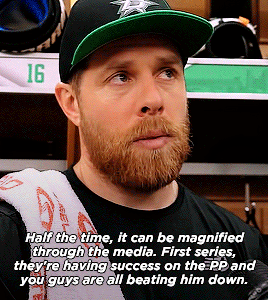


top line x supporting robo
DAL @ CGY (03.18.23) — after hitting the 40-goal mark and scoring the ot gwg in calgary following a small slump
SEA @ DAL (05.11.23) — during robo's 8-game post-season scoring drought, right before his 3-assist night against seattle
DAL @ VGK (05.27.23) — after robo's 5v5 break-out and 4 goals in 4 games in the vegas series
#jason robertson#joe pavelski#roope hintz#dallas stars#stars#*#niche gifset trying to articulate what i love about top line's communication style don't mind me#understated but highly reflective and discerning problem-oriented system that knows exactly when to push and support one another#even if so much of it /is/ Do The Right Thing or Make The Right Play that's not to say there aren't highly manual and emotionally-dependent#processes that influence their in-game automation#and it takes three people who are both aligned in the standards they hold themselves to on the top line and who know how to reliably#navigate and distribute that pressure amongst themselves#i'm normal..........#i do think roop being like yeah we talked about it i told him to chill out is legitimately romance though.
145 notes
·
View notes
Text
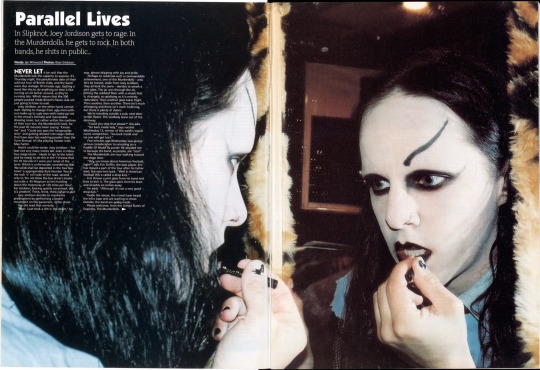
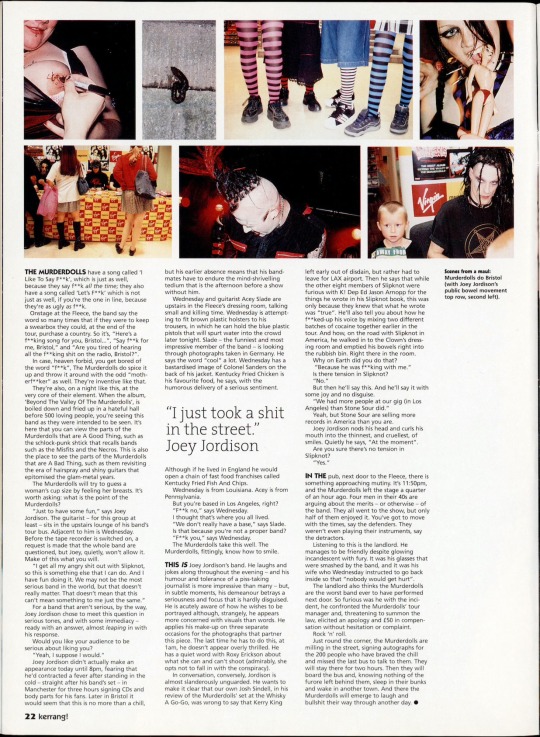


Parallel Lives
Kerrang 923, September 28 2002
In Slipknot, Joey Jordison gets to rage. In the Murderdolls, he gets to rock. In both bands, he shits in public…
Words: Ian Winwood Photos: Roxy Erickson
Never let it be said that the Murderdolls lack the capacity to surprise. It’s Thursday night, the penultimate date of their sold-out tour of British clubs, and the band were due onstage 10 minutes ago. Getting a band like this to do anything on time is like turning an oil tanker around, so they’re running late. Which means that the 500 people packed inside Bristol’s Fleece club are just going to have to wait.
Joey Jordison, on the other hand, cannot wait. Opting to change from ugly-men-without-make-up to ugly-men-with-make-up not in the venue’s intimate and inaccessible dressing room, but in their tour bus, the Murderdolls have, for the past 45 minutes, been saying “Excuse me” and “Could you pass the hairspray/lipstick” and getting dressed into stage clothes that have seen less washing powder than the Turin Shroud. It’s like playing Twister with Max Factor.
And it could be worse. Joey Jordison – five feet not very many inches tall, even in ridiculous stage boots – needs to ‘go to the toilet’, and he needs to do this in the ‘I’d leave that for 10 minutes if I were you’ sense of the term. Which is unfortunate, considering that ‘No solids shall be deposited in the tour bus toilet’ is appropriately Rule Number Two in the rock ‘n’ roll code of the road, second only to ‘Do not blow the bus driver’s brains out with a .45 Magnum as he’s hurtling down the motorway at 120 miles per hour’. For Jordison, looking quietly concerned, this is a problem. Think, think, think: what to do?
Joey Jordison decides to resolve his predicament by performing a bowel movement on the pavement, in the street.
You did read that correctly.
“Man, I just took a shit in the street,” he says, almost skipping with joy and pride.
Perhaps to celebrate such a commendable achievement, one of the Murderdolls – and, let’s be honest, aside from Joey Jordison, they all look the same – decides to smash a pint glass. The jar arcs through the air, hitting the cobbled floor with a smash that is, strangely, as satisfying as it is entirely redundant. Then another glass takes flight. Then another, then another. There isn’t much whooping and there isn’t much hollering, but there is plenty of debris.
We’re standing outside a pub, next door to the Fleece. The landlady leans out of the doorway.
“Could you stop that please?” she asks.
“Go back inside lady,” says vocalist Wednesday 13, winner of this week’s stupid name competition. “Go back inside and no-one will get hurt.”
Five minutes ago Wednesday was giving serious consideration to urinating on a Puddle Of Mudd fly poster. He decided not to because the band, as people, are “cool”.
The Murderdolls are now walking toward the stage door.
“Hey, you know about American football right?” asks Eric Griffin, the bass player. Eric has missed a part of the tour after his father died, but now he’s back. “Well in American football this is called a drop-kick.”
Eric throws a pint glass from his hand and tries to kick it. The glass spins from his boot and smashes six inches away.
He adds: “Although it’s not a very good drop-kick.”
Inside the venue, the crowd have heard the intro tape and are starting to cheer. Outside, the band are going inside.
Please welcome, from the United States of Stupidity, The Murderdolls.
The Murderdolls have a song called ‘I Like (sic) To Say Fuck’, which is just as well, because they say fuck all the time; they also have a song called ‘Let’s Fuck’ which is not just as well, if you’re the one in line, because they’re all as ugly as fuck.
Onstage at the Fleece, the band say the word so many times that if they were to keep a swearbox they could, at the end of the tour, purchase a country. So it’s, “Here’s a fucking song for you, Bristol,” and “Are you tired of hearing all the fucking shit on the radio, Bristol?”.
In case, heaven forbid, you get bored of the word “fuck”, The Murderdolls do spice it up and throw it around with the odd “motherfucker” as well. They’re inventive like that.
They’re also, on a night like this, at the very core of their element. When the album, ‘Beyond The Valley Of The Murderdolls’, is boiled down and fried up in a hateful hall before 500 loving people, you’re seeing this band as they were intended to be seen. It’s here that you can view the parts of the Murderdolls that are A Good Thing, such as the schlock-punk shtick that recalls bands such as the Misfits and the Necros. This is also the place to see the parts of the Murderdolls that are A Bad Thing, such as them revisiting the era of hairspray and shiny guitars that epitomised the glam-metal years.
The Murderdolls will try to guess a woman’s cup size by feeling her breasts. It’s worth asking: what is the point of the Murderdolls?
“Just to have some fun,” says Joey Jordison. The guitarist – for this group at least – sits in the upstairs lounge of his band’s tour bus. Adjacent to him is Wednesday. Before the tape recorder is switched on, a request is made that the whole band are questioned, but Joey, quietly, won’t allow it. Make of this what you will.
“I get all my angry shit out with Slipknot, so this is something else that I can do. And I have fun doing it. We may not be the most serious band in the world, but that doesn’t really matter. That doesn’t mean that this can’t mean something to me just the same.”
For a band that aren’t serious, by the way, Joey Jordison chose to meet this question in serious tones, and with some immediacy – ready with an answer, almost leaping in with his response.
Would you like your audience to be serious about liking you?
“Yeah, I suppose I would.”
Joey Jordison didn’t actually make an appearance today until 8pm, fearing that he’d contracted a fever after standing in the cole – straight after his band’s set – in Manchester for three hours signing CDs and body parts for his fans. Later in Bristol it would seem that this is no more than a chill, but his earlier absence means that his bandmates have to endure the mind-shrivelling tedium that is the afternoon before a show without him.
Wednesday and guitarist Acey Slade are upstairs in the Fleece’s dressing room, talking small and killing time. Wednesday is attempting to fit brown plastic holsters to his trousers, in which he can hold the blue plastic pistols that will spurt water into the crowd later tonight. Slade – the funniest and most impressive member of the band – is looking through photographs taken in Germany. He says the word “cool” a lot. Wednesday has a bastardised image of Colonel Sanders on the back of his jacket. Kentucky Fried Chicken is his favourite food, he says, with the humorous delivery of a serious sentiment. Although if he lived in England he would open a chain of fast food franchises called Kentucky Fried Fish And Chips.
Wednesday is from Louisiana (sic). Acey is from Pennsylvania.
But you’re based in Los Angeles, right?
“Fuck no,” says Wednesday.
I thought that’s where you all lived.
“We don’t really have a base,” says Slade.
Is that because you’re not a proper band?
“Fuck you,” says Wednesday.
The Murderdolls take this well. The Murderdolls, fittingly, know how to smile.
This is Joey Jordison’s band. He laughs and jokes along throughout the evening – and his humour and tolerance of a piss-taking journalist is more impressive than many – but, in subtle moments, his demeanour betrays a seriousness and focus that is hardly disguised. He is acutely aware of how he wishes to be portrayed although, strangely, he appears more concerned with visuals than words. He applies his make-up on three separate occasions for the photographs that partner this piece. The last time he has to do this, at 1am, he doesn’t appear overly thrilled. He has a quiet word with Roxy Erickson about what she can and can’t shoot (admirably, she opts not to fall in with the conspiracy).
In conversation, conversely, Jordison is almost slanderously unguarded. He wants to make it clear than our own Josh Sindell, in his review of the Murderdolls’ set at the Whisky A Go-Go, was wrong to say that Kerry King left early out of disdain, but rather had to leave for LAX airport. Then he says that while the other eight members of Slipknot were furious with K! Dep Ed Jason Arnopp for the things he wrote in his Slipknot book, this was only because they knew that what he wrote was “true”. He’ll also tell you about how he fucked-up his voice by mixing two different batches of cocaine together earlier in the tour. And how, on the road with Slipknot in America, he walked in to the Clown’s dressing room and emptied his bowels right into the rubbish bin. Right there in the room.
Why on Earth did you do that?
“Because he was fucking with me.”
Is there tension in Slipknot?
“No.”
But then he’ll say this. And he’ll say it with some joy and no disguise.
“We had more people at our gig (in Los Angeles) than Stone Sour did.”
Yeah, but Stone Sour are selling more records in America than you are.
Joey Jordison nods his head and curls his mouth into the thinnest, and cruellest, of smiles. Quietly he says, “At the moment”.
Are you sure there’s no tension in Slipknot?
“Yes.”
In the pub next door to the Fleece, there is something approaching mutiny. It’s 11:50pm, and the Murderdolls left the stage a quarter of an hour ago. Four men in their 40s are arguing about the merits – or otherwise – of the band. They all went to the show, but only half of them enjoyed it. You’ve got to move with the times, say the defenders. They weren’t even playing their instruments, say the detractors.
Listening to this is the landlord. He manages to be friendly despite glowing incandescent with fury. It was his glasses that were smashed by the band, and it was his wife who Wednesday instructed to go back inside so that “nobody would get hurt”.
The landlord also thinks the Murderdolls are the worst band ever to have performed next door. So furious he was with the incident, he confronted the Murderdolls’ tour manager and, threatening to summon the law, elicited an apology and £50 in compensation without hesitation or complaint.
Rock ‘n’ roll.
Just round the corner, the Murderdolls are milling in the street, signing autographs for the 200 people who have braved the chill and missed the last bus to talk to them. They will stay there for two hours. Then they will board the bus and, knowing nothing of the furore left behind them, sleep in their bunks and wake in another town. And there the Murderdolls will emerge to laugh and bullshit their way through another day.
#problems. all of them.#murderdolls#joey jordison#wednesday 13#eric griffin#acey slade#ben graves#ben is only in a photo#interview#kerrang 923 sep 28 02#if you want anything else scanned lemme know#the staples in this one were not aligned so just pay the edges of the two page photo no mind please thanks
101 notes
·
View notes